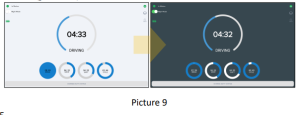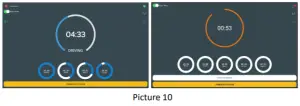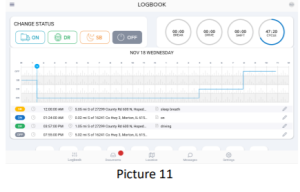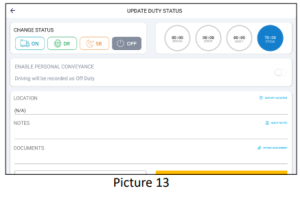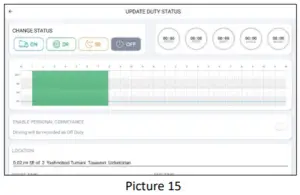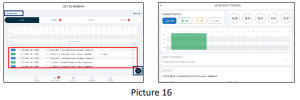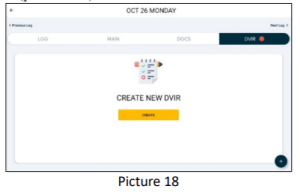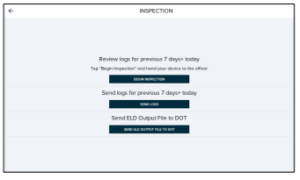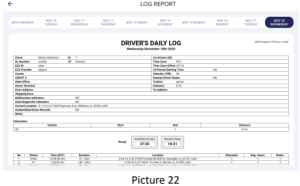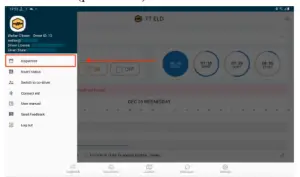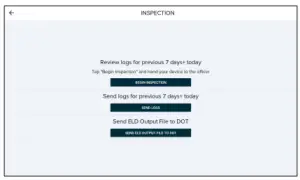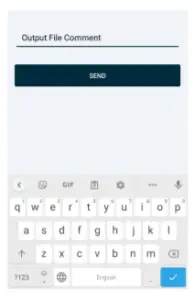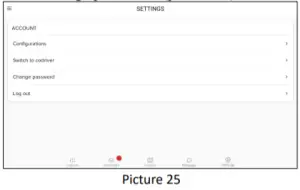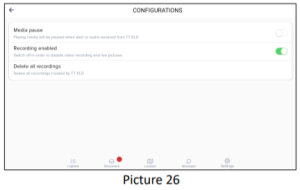TTELD ELD in Your Vehicle User Manual
INSTALL TTELD ELD IN YOUR VEHICLE
- Make sure your vehicle engine is turned off. If the engine is on, please turn it off and turn the key to the “Off” position before connecting ELD device
- Locate the diagnostic part inside your vehicle’s cabin. The diagnostic part is typically located in one of the following places (picture 1):1. Under the left side of the ash board;2. Under the steering wheel;3. Near the driver’s seat;4. Under the driver’s seat.

- Attach the TTELD ELD plug into the diagnostic part of the vehicle. Twist the plug base until it locks into place.

- Once plugged in, the device will start syncing with the engine control module [ECM] and TTELD ELD application on the tablet.

- Then get the tablet provided by fleet and turn it on. Tablet should automatically start application.
APPLICATION GUIDE
- Log into application using your User Name and Password (picture 4). If you do not have TTELD ELD account, please contact your fleet manager.

- Your cellular device will automatically scan ELD (picture 5)

- Driver should choose ELD (picture 6).

- If the ELD is connected to vehicle driver can see green icon on top right side of dashboard (picture 7).

USING TTELD ELD ON THE ROAD
- Once you have connected your mobile device to TTELD ELD, your driving time automatically recorded.
 When your vehicle begins moving, your duty status will automatically be set to “Driving”. At 5 mph (or more) the vehicle is considered to “Drive” and “On Duty” (picture 8).
When your vehicle begins moving, your duty status will automatically be set to “Driving”. At 5 mph (or more) the vehicle is considered to “Drive” and “On Duty” (picture 8). - Swipe sign (top left corner of the app) to switch to “Night Mode”. Swipe sign to switch back to the “Day Mode”

- When driver stops status on top left changes from “In motion” to “Stationary” and “Change duty status” will appear. If driver not takes an action after 80 sec, another button “CONTINUE DRIVING” and countdown circle will appear (picture 10).

- If no action taken app will change status to “Off mode” (Picture 11).

USING TTELD ELD OFF ROAD
- Select the status “Off Duty”, “Sleeper”, “On Duty” (picture 12).

- Fill out location field and put remarks, such as “Pre-trip inspection” or “Coffee break” (if the location field is left empty, it will be automatically set) (picture 13).

- Insert missing status (“On Duty”, “Sleeper” or “Off Duty”) by tapping or edit existing status by tapping if any corrections are needed (picture 14).

- Choose the status you want to change and set the time frame (picture 15).

OTHER OPTIONS
- Go to “Documents” options available from the main screen: Choose status to change or add new status (Driver can go to previous time frame to make changes (picture 16).

- Put your recording and save to system at “MAIN” (picture 17).

- Make a Driver Vehicle inspection report [DVIR] go to “DVIR” (picture 18).

- Insert the status of the vehicle, if defect is detected tap “ADD DEFECT” (picture 19). And choose defect from list “unit” and “trailer”

OTHER OPTIONS
- Tap “NEXT” and put your signature to verify. If defects are corrected mechanics signature required (picture 20).

OFFICER INSPECTION
It’s easy to provide on officer with your driving information.
- Tap “Menu” bar icon on the top left corner and select “INSPECTIONS” (picture 21).

- Tap “Begin inspection” and show your electronic logbook 8- day summary to the officer (picture 22).The application will generate the report for the officer

- Tap “Menu” bar icon on the top left corner and select “INSPECTIONS” (picture 21).

- Tap “Send electronic log book to DOT” and show your electronic logbook 8-day summary to the officer (picture 22).

- Select “Send electronic log book to DOT” (picture 23).

- Type Output File Comment and tab “Send” (picture 24).

SETTINGS
- Choose “Settings” from the bottom, where driver change general settings from “Configurations”, “switch to codriver” or “Change password” (picture 25).

- From menu list choose “Configurations” to change sound settings, violations visibility, to change password (picture 26).

ELD MALFUNCTIONS
395.22 Motor carrier Responsibilities A motor carrier must ensure that its drivers possess onboard a commercial motor vehicle and ELD information packet containing the following items:An instruction sheet for the driver describing ELD malfunction reporting requirements and recordkeeping procedures during ELD malfunctions.
The following instructions are in accordance with the guidelines set forth in 395-34
GPSTab ELD will monitor and report malfunction data base on section 4.6 ELD’s Self-Monitoring of Required Functions table 4:
P – “Power compliance” malfunction,E – “Engine synchronization compliance” malfunction,T – “Timing compliance” malfunction,L – “Positioning compliance” malfunction,R – “Data recording compliance” malfunction,S – “Data transfer compliance” malfunction,O – “Other” ELD detected malfunction.
[xyz-ips snippet=”download-snippet”]



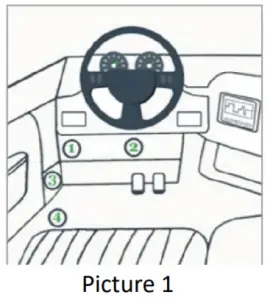
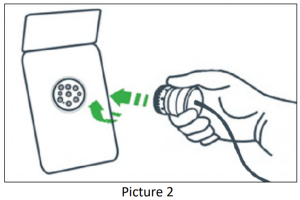
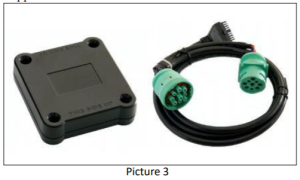
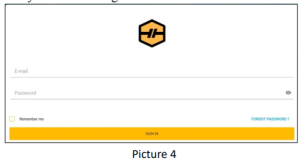
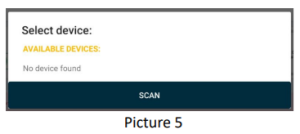
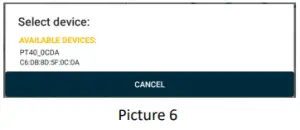
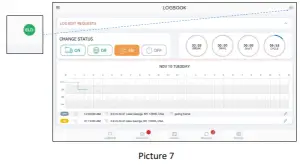
 When your vehicle begins moving, your duty status will automatically be set to “Driving”. At 5 mph (or more) the vehicle is considered to “Drive” and “On Duty” (picture 8).
When your vehicle begins moving, your duty status will automatically be set to “Driving”. At 5 mph (or more) the vehicle is considered to “Drive” and “On Duty” (picture 8).